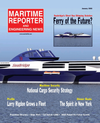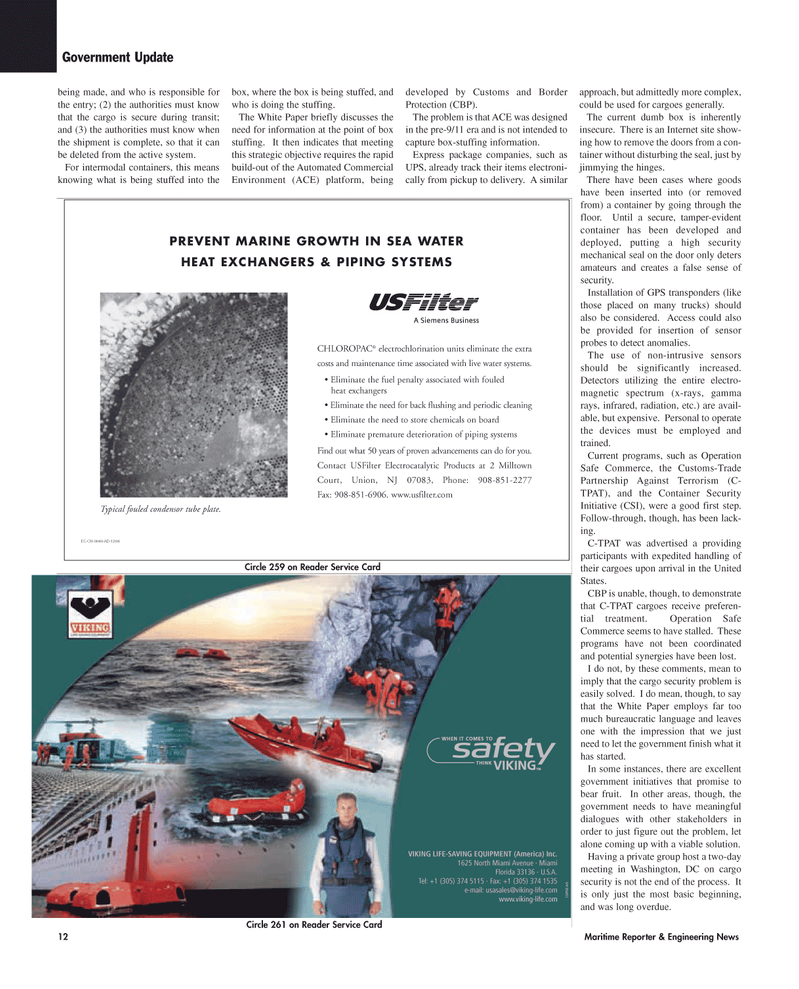
Page 12: of Maritime Reporter Magazine (January 2, 2005)
Read this page in Pdf, Flash or Html5 edition of January 2, 2005 Maritime Reporter Magazine
12 Maritime Reporter & Engineering News being made, and who is responsible for the entry; (2) the authorities must know that the cargo is secure during transit; and (3) the authorities must know when the shipment is complete, so that it can be deleted from the active system.
For intermodal containers, this means knowing what is being stuffed into the box, where the box is being stuffed, and who is doing the stuffing.
The White Paper briefly discusses the need for information at the point of box stuffing. It then indicates that meeting this strategic objective requires the rapid build-out of the Automated Commercial
Environment (ACE) platform, being developed by Customs and Border
Protection (CBP).
The problem is that ACE was designed in the pre-9/11 era and is not intended to capture box-stuffing information.
Express package companies, such as
UPS, already track their items electroni- cally from pickup to delivery. A similar approach, but admittedly more complex, could be used for cargoes generally.
The current dumb box is inherently insecure. There is an Internet site show- ing how to remove the doors from a con- tainer without disturbing the seal, just by jimmying the hinges.
There have been cases where goods have been inserted into (or removed from) a container by going through the floor. Until a secure, tamper-evident container has been developed and deployed, putting a high security mechanical seal on the door only deters amateurs and creates a false sense of security.
Installation of GPS transponders (like those placed on many trucks) should also be considered. Access could also be provided for insertion of sensor probes to detect anomalies.
The use of non-intrusive sensors should be significantly increased.
Detectors utilizing the entire electro- magnetic spectrum (x-rays, gamma rays, infrared, radiation, etc.) are avail- able, but expensive. Personal to operate the devices must be employed and trained.
Current programs, such as Operation
Safe Commerce, the Customs-Trade
Partnership Against Terrorism (C-
TPAT), and the Container Security
Initiative (CSI), were a good first step.
Follow-through, though, has been lack- ing.
C-TPAT was advertised a providing participants with expedited handling of their cargoes upon arrival in the United
States.
CBP is unable, though, to demonstrate that C-TPAT cargoes receive preferen- tial treatment. Operation Safe
Commerce seems to have stalled. These programs have not been coordinated and potential synergies have been lost.
I do not, by these comments, mean to imply that the cargo security problem is easily solved. I do mean, though, to say that the White Paper employs far too much bureaucratic language and leaves one with the impression that we just need to let the government finish what it has started.
In some instances, there are excellent government initiatives that promise to bear fruit. In other areas, though, the government needs to have meaningful dialogues with other stakeholders in order to just figure out the problem, let alone coming up with a viable solution.
Having a private group host a two-day meeting in Washington, DC on cargo security is not the end of the process. It is only just the most basic beginning, and was long overdue.
PREVENT MARINE GROWTH IN SEA WATER
HEAT EXCHANGERS & PIPING SYSTEMS
CHLOROPAC ® electrochlorination units eliminate the extra costs and maintenance time associated with live water systems. • Eliminate the fuel penalty associated with fouled heat exchangers • Eliminate the need for back flushing and periodic cleaning • Eliminate the need to store chemicals on board • Eliminate premature deterioration of piping systems
Find out what 50 years of proven advancements can do for you.
Contact USFilter Electrocatalytic Products at 2 Milltown
Court, Union, NJ 07083, Phone: 908-851-2277
Fax: 908-851-6906. www.usfilter.com
Typical fouled condensor tube plate.
EC-CH-0040-AD-1204
COPSØ A/S
VIKING LIFE-SAVING EQUIPMENT (America) Inc. 1625 North Miami Avenue · Miami
Florida 33136 · U.S.A.
Tel: +1 (305) 374 5115 · Fax: +1 (305) 374 1535 e-mail: [email protected] www.viking-life.com
Circle 261 on Reader Service Card
Government Update
Circle 259 on Reader Service Card
MR JANUARY 2005 #2 (9-16).qxd 1/5/2005 2:46 PM Page 4

 11
11

 13
13
